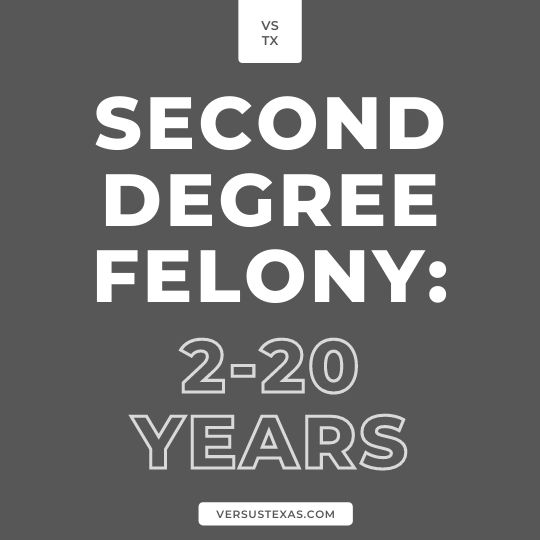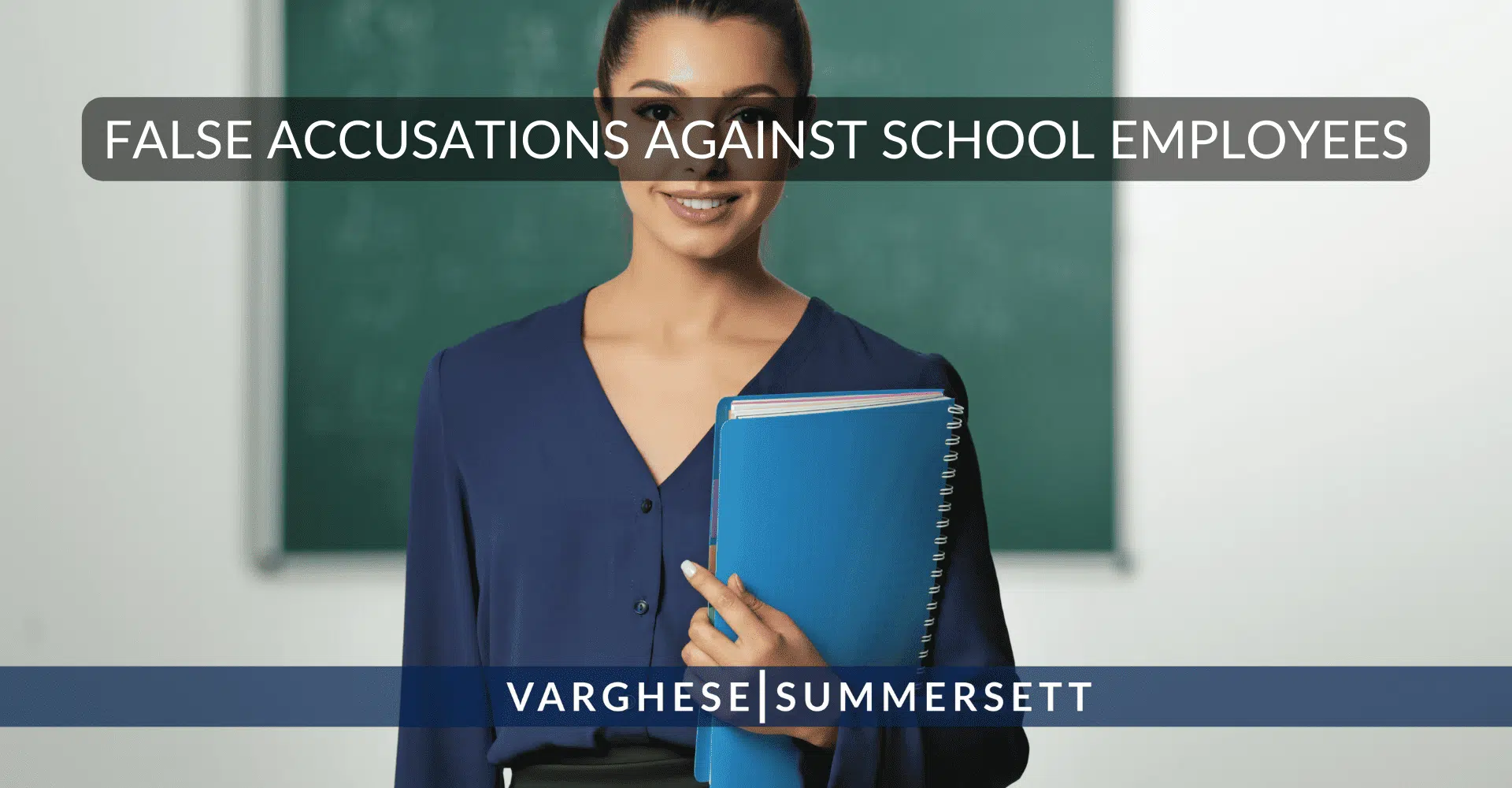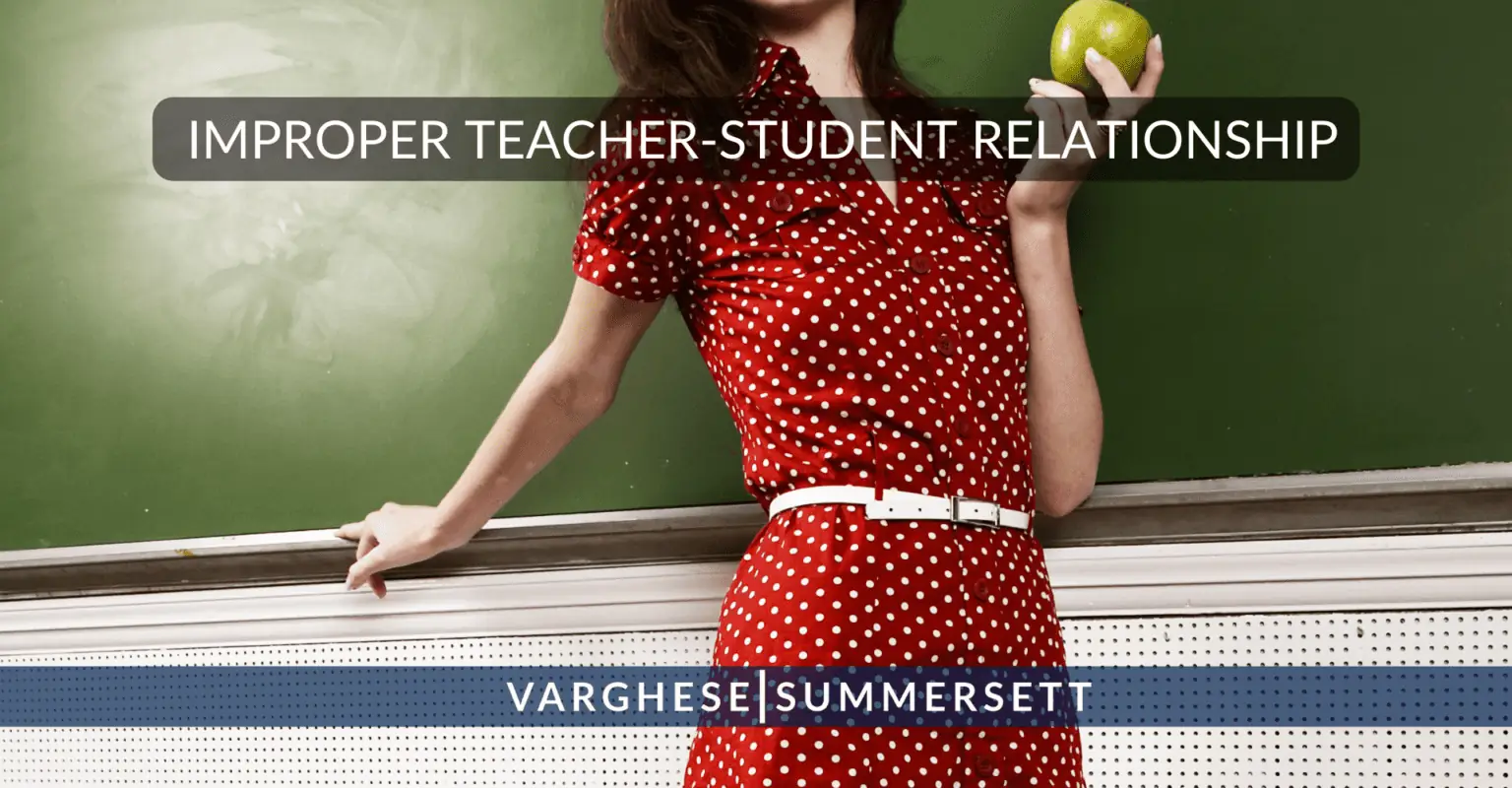Dallas Lawyer for Improper Teacher-Student Relationship [2023]
Every year, hundreds of school employees across Texas are accused of having an improper relationship with a student. Just the allegation alone – whether true or not – will wreak havoc on their professional and personal life. For starters, the employee will be automatically placed on administrative leave pending the investigation and, from there, it will probably only get worse.
If an arrest is made – which is likely – the employee’s freedom, reputation, and career will now be in jeopardy. Life, as they know it, will never be the same – at least for quite some time.
That’s why it’s critical for anyone accused of having an improper sexual relationship with a student in Dallas or the surrounding areas to retain a skilled legal team with experience handling these complex and highly emotional cases. We can help.
At Varghese Summersett, we have a proven track record of defending clients accused of improper teacher-student relationships and also have a reputation management team in place to help manage media attention and public perception.
In this article, our Dallas lawyer for improper teacher-student relationship explains the law, potential penalties, and possible defenses. We also answer some frequently asked questions about this offense. But first, please take a moment to watch this informative video by Board Certified Criminal Attorney Benson Varghese.
Texas Law Prohibiting Improper Relationship Between Educator and Student
Improper teacher-student relationships are explicitly prohibited under Texas Penal Code Section 21.12. It’s a somewhat lengthy statute which we will put in its entirety below. Simply put, it prohibits a school employee from having sexual contact with a student.
Notice we said “school employee” – that’s because the law applies to anyone working on a primary or secondary school campus, ranging from a custodian to a teacher aide to a principal.
According to the law, an employee of a public or primary or secondary school person commits an improper relationship between an educator and a student if he or she:
1) engages in sexual contact, sexual intercourse, or deviate sexual intercourse with a person who is enrolled in a public or private primary or secondary school at which the employee works;
2) holds a certificate or permit issued by the State Board for Educator Certification or is required to be licensed by a state agency under the Texas Education Code and engages in sexual contact, sexual intercourse, or deviate sexual intercourse with a student they know is enrolled in a public primary or secondary school in the same school district as the school at which they work; or a student participant in an educational activity that is sponsored by a school district or a public or private primary or secondary school if students enrolled in a public or private primary or secondary school are the primary participants in the activity and the alleged offender provides education services to those participants; or
3) Engages in online solicitation of a minor with a person the employee knows is a person enrolled in a public primary or secondary school in the same school district as the school at which the employee works, or a student participant in an educational activity that is sponsored by a school district or a public or private primary or secondary school, if students enrolled in a public or private primary or secondary school are the primary participants in the activity and the employee provides education services to those participants.
As you can see, there are several ways that a person can be charged with improper relationship between an educator and a student. Lawmakers made the statute very broad in an attempt to cover any possible scenario. If you or a family member has been accused of this offense, call for a free consultation with a Dallas lawyer for improper-teacher relationships at Varghese Summersett today.
Penalties for Improper Relationship Between Educator and Student
Improper relationship between an educator and a student is considered a felony of the second degree, punishable by 2 to 20 years in prison and a fine of up to $10,000. A conviction can also lead to the loss of your teaching license, pension, educational opportunities, and future employment prospects.
With so much at stake, it is crucial to act swiftly and enlist the expertise of a Dallas lawyer for improper teacher-student relationship.

Sex Offender Registration
In Texas, a conviction for the improper relationship between an educator and student can be severe, resulting in prison time and a steep fine. However, under current Texas law, as of September 2023, individuals convicted of this offense are not required to register as a sex offender.
Having said that, lawmakers every session introduce bills to try and change this. Be sure and consult a Dallas lawyer for improper teacher-student relationship to ascertain the latest amendment date for Code of Criminal Procedure 62.001.
And while a conviction for having an improper relationship is not subject to registration, other related charges like aggravated sexual assault of a child or online solicitation of a minor may require registration. Learn more about sex offender registration.
Potential Defenses for Improper Relationship Between Educator and Student
Just because you’ve been charged with having an improper relationship between an educator and a student in Dallas does not mean you will be convicted of the offense. Our team will build a strong defense on your behalf and do everything in our power to produce the most favorable outcome possible.
Some of these defenses may include challenging the evidence presented, contesting the credibility of witnesses, examining the circumstances surrounding the allegations, or demonstrating the absence of any illicit relationship.
It’s also important to point out that it is an affirmative defense to prosecution if the student and employee were married at the time of the offense; or if the school employee was not more than three years older than the student and, at the time of the offense, the employee and student were in a relationship that began before the employee’s employment at the school.

False Accusations Against School Employees
False accusations against school employees can have devastating consequences for the accused, tarnishing their reputation and leading to legal repercussions. Here’s some potential reasons for false accusations and tips on how to protect yourself:
Causes of False Accusations
Several factors can contribute to false accusations against school employees:
- Misunderstandings or Misinterpretations: Innocent interactions between educators and students can sometimes be misinterpreted as inappropriate conduct, especially in situations where boundaries are not clearly defined.
- Malicious Intent: In some instances, false accusations may arise from personal vendettas, grudges, or attempts to harm the reputation of a school employee.
- Emotional or Psychological Issues: Students may make false accusations due to emotional distress, seeking attention, or as a way to divert attention from their own misconduct.
- Peer Pressure: Pressure from peers or the desire to fit in with certain social groups may lead students to make untrue allegations against school employees.
- Mistaken Identity: In rare cases, accusations may be directed at the wrong person due to a mix-up or confusion.
Protecting Yourself Against False Accusations
- Establish and Maintain Professional Boundaries: As a school employee, it’s essential to maintain clear and professional boundaries with students. Avoid situations that could be misinterpreted, and be cautious with social media interactions.
- Document Interactions: Keep detailed records of all interactions with students, including communication, meetings, and any unusual incidents. This documentation can serve as evidence to refute false accusations.
- Follow School Policies and Protocols: Adhere to the school’s code of conduct and reporting procedures. Promptly report any concerning behavior to appropriate authorities.
- Avoid One-on-One Situations: When possible, avoid being alone with a student. If a private conversation is necessary, conduct it in an open, observable area.
- Build Strong Relationships: Foster positive relationships with students, fellow staff members, and parents to reduce the likelihood of false accusations arising from misunderstandings or personal issues.
- Seek Legal Representation: If you find yourself wrongfully accused, seek immediate legal counsel from an experienced defense attorney who has handled these types of cases. They can help protect your rights and guide you through the legal process. Do not voluntarily talk to school officials or police without an attorney.
- Stay Calm and Professional: Facing false accusations can be emotionally distressing, but it’s crucial to remain composed and maintain professionalism throughout the process.
By taking proactive measures to safeguard yourself and maintaining professional boundaries, you can help protect your career and reputation as a dedicated school employee.
Reporting Obligations by School Officials
School officials in Texas are required by law to report accusations of improper relationships between educators and students. The reporting obligation is outlined in the Texas Education Code, specifically Section 21.006. According to this law, any school district employee who has credible information about an improper relationship with a student must report it to the appropriate authorities within seven business days.
The reporting process involves notifying both the school district’s superintendent and the Texas Education Agency (TEA) of the suspected improper relationship. The school district is responsible for conducting an investigation into the alleged misconduct promptly. If the investigation reveals evidence supporting the existence of an improper relationship, the district must report the findings to the TEA.
The penalties for failing to report an improper relationship can be severe for school district employees. Failing to fulfill the reporting requirement may lead to disciplinary actions, including termination of employment, revocations of certification, administrative fines, and potential criminal charges.
Speak to a Dallas Lawyer for Improper Teacher-Student Relationship Today
At Varghese Summersett, we understand the complexities and sensitivity of improper teacher-student relationship cases. Our highly experienced team of criminal defense attorneys will work diligently to protect your rights and reputation, analyze the evidence, and craft a compelling defense tailored to your unique situation.
We are committed to providing an aggressive and strategic defense to help secure the best possible outcome for your case. Don’t wait; call us today at 214-903-4000 to schedule a consultation with a seasoned Dallas lawyer for improper teacher-student relationship. Your future is too important to leave to chance.

FAQs About Improper Relationships Between Educator-Student
What constitutes an improper relationship between educators and students in Texas?
An improper relationship refers to any sexual contact, regardless of the student’s age or consent, between an educator (such as a teacher, school employee, or principal) and a student enrolled in primary or secondary education. This type of relationship is strictly prohibited under Texas law.
What is considered “sexual contact” under Texas law?
“Sexual contact” means any touching of the anus, breast, or any part of the genitals of another person with the intent to arouse or gratify the sexual desire of any person.
What is a primary or secondary school in Texas?
A primary or secondary school in Texas refers to an educational institution that provides education to students in the early stages of their academic journey. These schools encompass both elementary (primary) and middle/high (secondary) school levels.
- Primary School (Elementary School): This includes schools that cater to students in the early grades, typically from kindergarten through fifth or sixth grade, depending on the school district.
- Secondary School (Middle/High School): Secondary schools in Texas comprise middle schools, which generally encompass grades six or seven through eight, and high schools that typically cover grades nine through twelve.
What is the statute of limitations for prosecution of improper relationship between and educator and student?
The statute of limitations for an improper relationship between educator and student is three years.
Will my name be released to the media or the public if I’m accused of an improper relationship?
Under Texas law, your name will not be publically released unless you are indicted of the offense. If you are indicted, then the accusation can be reported to school members or community, which includes the media.
What should an educator do if they are falsely accused of having an improper relationship with a student in Texas?
If an educator is falsely accused of an improper relationship, they should seek legal representation immediately. Consulting with an experienced attorney specializing in education law and improper relationship cases can help protect their rights, gather evidence to refute the false allegations, and guide them through the legal process. It’s crucial to cooperate fully with any official investigations while maintaining professionalism throughout the ordeal.
Can an improper relationship allegation be made by any party, including students or parents?
Yes, an improper relationship allegation can be made by any concerned party, including students, parents, school staff, or even members of the public. When such allegations are reported, the school district and law enforcement take them seriously and conduct thorough investigations.
Accordion Title
If an educator is falsely accused of an improper relationship, they should seek legal representation immediately. Consulting with an experienced attorney specializing in education law and improper relationship cases can help protect their rights, gather evidence to refute the false allegations, and guide them through the legal process. It’s crucial to cooperate fully with any official investigations while maintaining professionalism throughout the ordeal.



